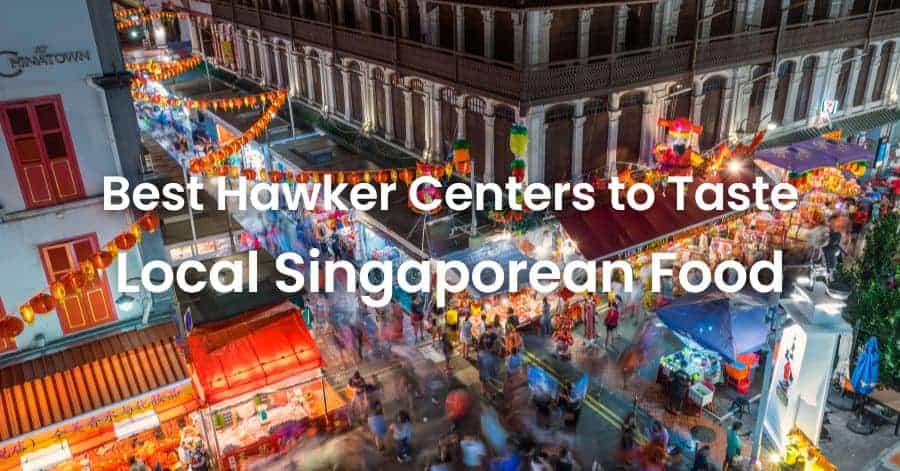Been wanting to try authentic local Singaporean food? Crave no more! Hawker Centres in Singapore are always the best option because they offer the most reasonably priced meals, including breakfast, lunch, dinner, and snacks.
A golden rule when traveling is to try the country’s famous local dishes in every country you visit. If it is your first time in Singapore and deciding what to eat, this article is for you! We gathered the best local food and locations where you can eat at an affordable price. You will be able to try a variety of cuisines in one place.
Choose the local Singaporean food you want to try from the list. Quickly find these by reading the signs in the Hawker Centers or asking the uncles and aunties there. It will save you time wondering what to eat among the several choices available.
10 Best Hawker Centres in Singapore

Singapore’s food culture combines Chinese, Indian, and Malay cultures, which is why its local food is also available in neighboring countries. A good selection of cuisine is available at every Hawker Centre for a great price ranging from 2SGD ($1.45 USD) to 10SGD ($7.27 USD) for each dish. It has a pleasant ambiance to enjoy a meal, drinks, desserts, and some alone time or social time with friends. Moreover, it promotes small businesses so that every business owner will have abundant sales. It’s impressive to see an open-air neighborhood similar to a food court with many unique stalls providing delicious dishes.
Note: Always follow the “no littering, no touting” rule, even on the Hawker Centres. You should also clean your table after you eat. There are designated places for your trays and trash can for the dirt.
The following Hawker Centres provide the best local Singaporean food you must try!
TourTeller’s Pick: Best Hawker Center Tours!



Albert Complex Hawker Centre
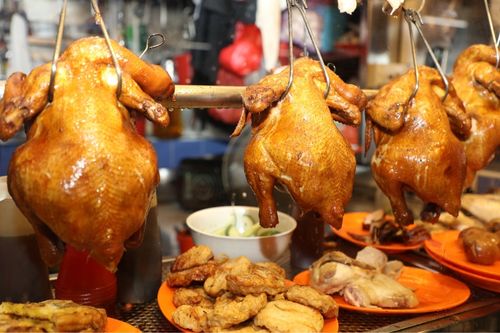
- Address: 270 Queen St, Singapore 180270
- Open Hours: Sunday-Monday, 7:00 am to 9:00 pm
Best Private Street Food Tours in Singapore



Amoy Street Food Centre
- Address: 7 Maxwell Rd, Singapore 069111
- Open Hours: Sunday-Monday, 6:30 am to 9:00 pm
Chinatown Complex Food Centre
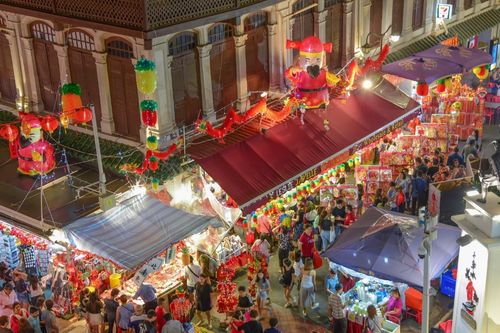
- Address: 46 Smith St, Singapore 058956
- Open Hours: Sunday-Monday, 8:00 am to 9:00 pm
Best Singapore Chinatown & Little India Food Tours


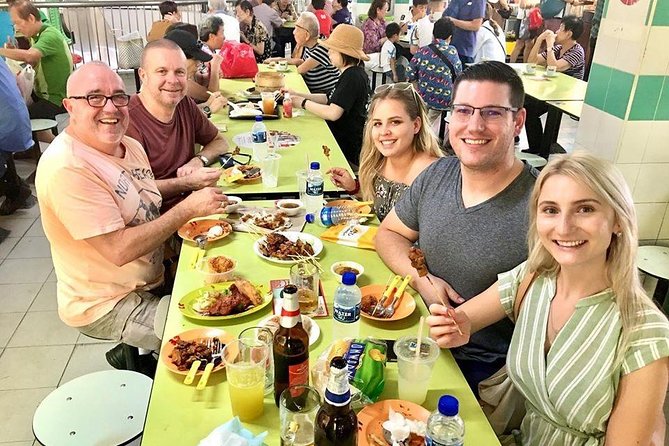
Chomp Chomp Food Centre
Hong Lim Market and Food Centre
- Address: 531A Upper Cross St, Singapore 051531
- Open Hours: Sunday-Monday, 24 hours
Lau Pa Sat
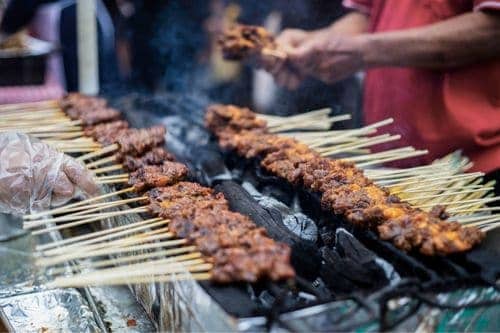
- Address: 18 Raffles Quay, Singapore 048582
- Open Hours: Monday-Sunday, 7:00 am to 2:00 am
Maxwell Food Centre
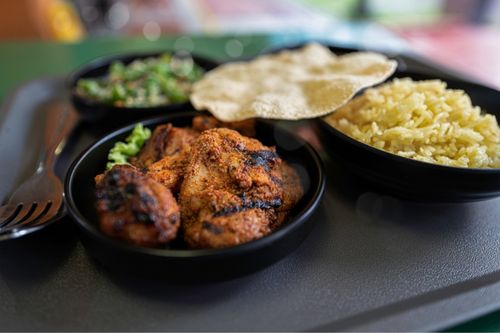
- Address: 1 Kadayanallur St, Singapore 069184
- Open Hours: Sunday-Monday, 8:00 am to 2:00 am
Old Airport Road Food Centre
- Address: 51 Old Airport Rd, Singapore 390051
- Open Hours: Sunday-Monday, 6:00 am to 10:30 pm
Tekka Centre
- Address: Bukit Timah Rd, Singapore
- Open Hours: Tuesday-Friday, 5:00 am to 1:00 pm / Saturday-Sunday, 5:00 am to 12:00 pm
Tiong Bahru Market
- Address: 30 Seng Poh Rd, Singapore 168898
- Open Hours: Sunday-Monday, 7:00 am to 10:00 pm
What are the Local Singaporean Foods?
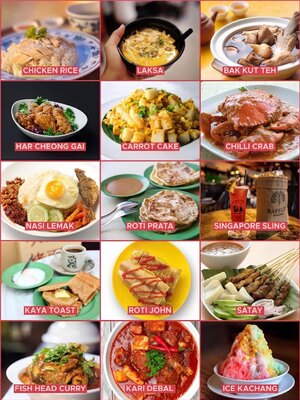
Chicken Rice
A simple yet delicious meal? Chicken rice is a Hainanese-influenced meal, known as Khao man gai in Thailand, and is one of the most well-known and adored foods to eat in Singapore. The taste of the juicy chicken, the rice flavor, and the various sauce styles make it a go-to meal for every local and tourist.
Note: Chicken rice is your best local Singaporean food choice if you are not fond of tastes beyond your comfort. The taste is good, and every local will tell you not to miss trying it! (It was on our top list whenever we eat, haha!)
Chili Crab
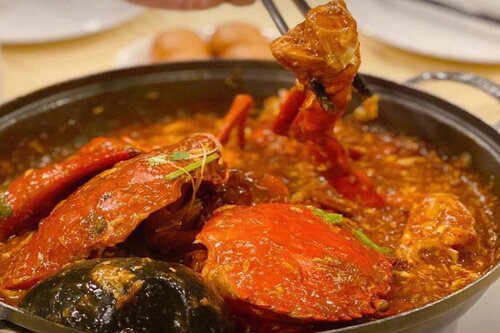
Chili crab is among Singapore’s most adored, unique family delicacies and one of the most well-known to eat. The sauce is the lifeblood of Singapore Chilli Crab. It is a seafood flavor explosion that is less fiery than the name would imply, delicately sweet, and intensely savory.
Note: Not need to wonder if it is super chili; it’s just the right amount of spiciness you need for a flavorful chili crab experience!
Nasi Lemak
Nasi lemak is a filling dish traditionally wrapped in brown paper or banana leaf and includes coconut rice, a hard-boiled egg, anchovies, a slice of cucumber, and chili paste. It’s either served with various curries like rendang or less spicy foods like fried chicken and fish.
The fragrant rice is cooked with coconut milk, salt, and occasionally pandan leaves to give it a lovely scent, which is the most crucial component of each plate of nasi lemak.
Laksa
Laksa is rice noodles with prawns, fish cakes, eggs, or chicken meat. While there are various variations of laksa, the one popular in Singapore is Katong laksa, which uses cut-up noodles. On occasion, cockles and tofu puffs are included. Moreover, there are wide distinct varieties of laksa, some of which are more water-based, and some contain creamy coconut milk.
Chai Tow Kway or Carrot Cake
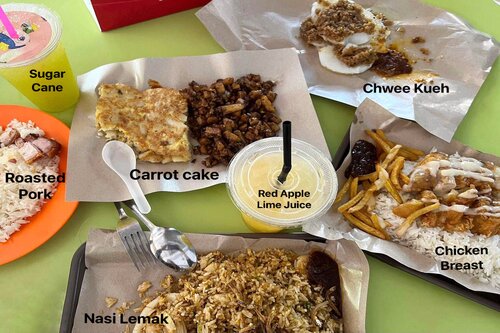
Carrot cake but no carrots as an ingredient?! The carrot cake in Singapore doesn’t contain carrots, unlike the sweet carrot cake created in the Western way. Still, it gained its name since it’s made with daikon radish, a Chinese dialect referring to both daikon radish and carrots. The ingredients are rice flour, daikon flakes, and eggs cooked in a lot of pork grease.
There are two types of carrot cake or chai tow kway: black and white. Despite the differences in appearance, the processing of the ingredients is the same. The dry soy sauce that gives black carrot cake its color also gives the food a sweeter flavor. Thus, it comes down to personal preference for many. I prefer the white version because it is less oily and sweet.
Satay
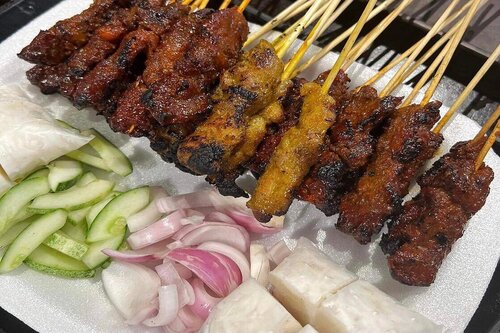
Satay (or sate) originated in Indonesia but has influences from India and the Middle East; it is popular throughout Southeast Asia, including Singapore. It is a grilled beef skewered and served with cucumber, onion, chili, peanut sauce, and rice cake (ketupat). Since turmeric is the main spice used in the marinade, it has a strong flavor and aroma. You can pick from mutton, beef, chicken, or pork.
Kaya Toast
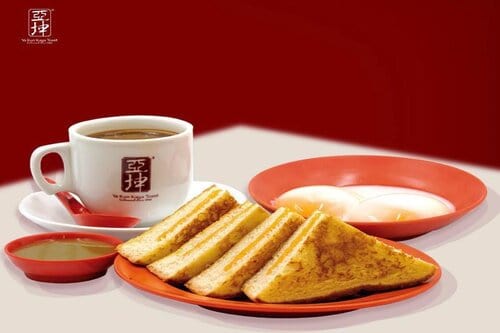
Popularly served on toast as a snack or breakfast, kaya is a sweet jam prepared from coconut cream and sugar and frequently flavored with pandan leaves. Moreover, complete your meal with a soft-boiled egg and hot or iced coffee!
Note: If you are looking for an alternative, try the Chicken Char Siew Toastwich — every bite is delicious.
Fish Head Curry
A large fish head cooked in curry with veggies and eaten with rice or bread, most frequently served with a glass of calamansi, local lime juice, or tamarind to enhance a sweet-sour flavor.
Roasted Meat
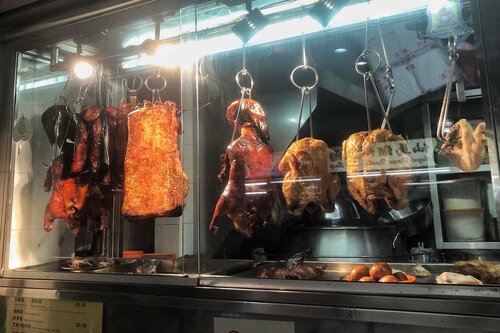
Cantonese-style roast meat restaurants provide various roast meat options, including pork, pork belly, duck, and chicken. All the meat is marinated in multiple seasonings before being roasted until the skin is golden and just charred for the best tenderness and juiciness possible, as well as the incredible smokey flavor.
Note: Try the roast duck for lean flesh and crispy, thick skin!
Bak Kut Teh
Bak kut teh, or pig bone tea, is a dish of Chinese origins enjoyed widely in Malaysia and Singapore. Pork ribs are typically cooked in water with white pepper, tons of garlic, and salt until the meat is soft and the flavor is infused throughout the pig bones, yielding a hearty soup.
In addition to a bowl of rice, bak kut teh is frequently served with Chinese side dishes such as braised tofu or preserved mustard greens. Of course, drinking hot Chinese tea is required to accompany eating bak kut teh.
Har Cheong Gai
Har Cheong Gai is not your typical fried chicken wing! Before being deep fried, it is marinated in flour with fermented shrimp paste, which gives the food its signature gloriously savory, salty, and sour flavor.
In addition to various other spices and seasonings, Har Cheong (fermented shrimp paste) is used to make har Cheong gai. The shrimp paste is the pinkish-gray southeastern Chinese style rather than the darker Malaysian paste used for rojak sauce.
Roti John
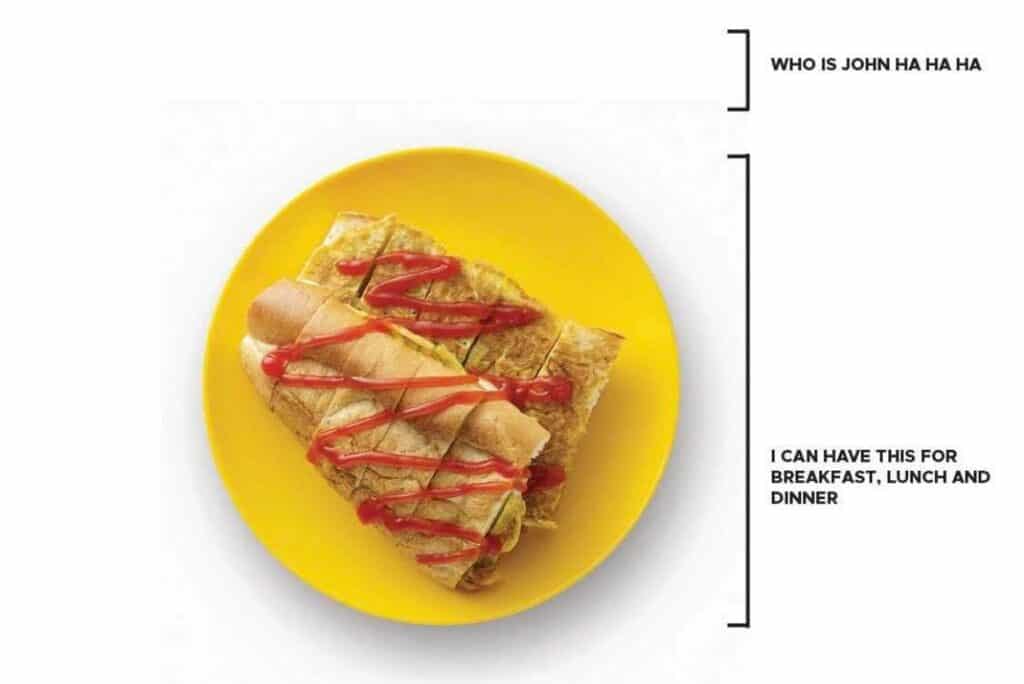
The Sanskrit word “roti,” which means “bread,” and more broadly, “any dish based on bread or resembling bread,” includes sandwiches and pancakes. A baguette-like loaf is used to make the sandwich, filled with fried egg, chicken, sardine, or mutton mince, onion, and tomato-chili sauce.
Roti Prata
With or without eggs, Roti Prata is a flaky Indian bread that is typically eaten with a hearty lentil dish. When serving the Tarik, the tea is combined with carnation milk and “pulled” from one mug to another to produce foam.
Rojak
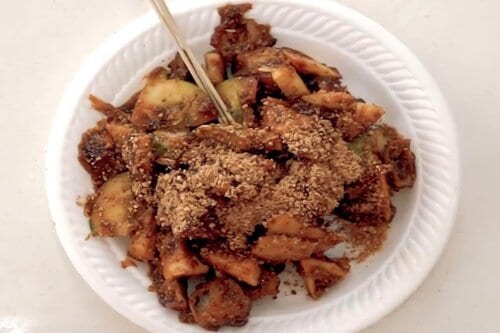
Rojak is the best concoction for sending your taste buds into a sweet and salty one. In Singapore, hawker centers frequently sell both Chinese and Indian rojak. Slices of fruit, such as pineapple or guava, Chinese youtiao, bean sprouts, water morning glory, and other ingredients, are frequently in Chinese rojak. These elements are all combined with a shrimp paste and palm sugar glaze before being topped with crushed peanuts. The chopped-up mixture of deep-fried fritters, potatoes, veggies, and fruit served with a peanut sweet-and-spicy sauce can be found in the Indian version of rojak.
Char Kuay Teow
Char Kuay Teow is a broad white noodle fried with bean sprouts, fish cake, clams, Chinese sausage, and black soy sauce.
Kari Debak Ice Kachang
Shaved Iced? No, it’s Kari Debak Ice Kachang! Red beans, jellies, and light-packed shaved ice are placed at the bottom of the bowl. On top, a variety of syrups are poured, followed by condensed milk and sweet cream corn.
Kopi-O, Sugar Cane, Red Apple Lime Juice, Teh Tahrik, and Singapore Sling
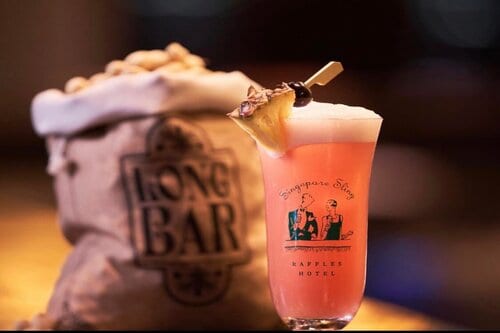
You can’t complete a meal without a drink! To satisfy your thirst, you can try any of these: Kopi-O, Sugar Cane, Red Apple Lime Juice, Teh Tahrik, and Singapore Sling. All are famous in Singapore and recommended by locals.
Note: Do not miss the Kopi-O (local coffee)! We are not exaggerating; it tastes great. You can drink it every day if you stay in Singapore. The best thing is that it is affordable. It’s more or less 2SGD ($1.45 USD). In contrast, Singapore Sling is a national drink and is somewhat expensive. It’s available at Raffles Hotel located at 1 Beach Rd, Singapore 189673.
Local Singaporean food is at nearly all hawker centers throughout the city. Additionally, the prices are affordable, considering the incredible options. Each person has a favorite version of the local food, and it is up to you to find yours! Let us know which local Singaporean food you liked the best.
Best Street Food Tours in Singapore









You may also like:
